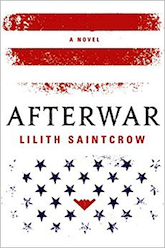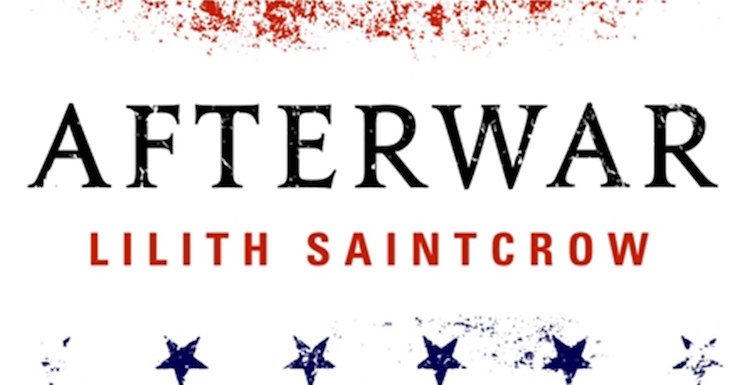If, like me, you’re familiar with Lilith Saintcrow’s backlist, Afterwar may come as a surprise. It’s not that Saintcrow’s previous books weren’t dark. They could be plenty dark—but they were, in the main, dark within the emotional expectations of dark urban fantasy or steampunk as a genre. Afterwar is the first of Saintcrow’s novels that I’ve read than can be parsed as purely science-fictional, and the first that is purely human in its horror. It is also very much in dialogue with the present political moment in American life, where at least one swastika-burning Nazi rally has occurred and been reported in the international press.
This is a novel of an America where a coalition of “Federal” forces and guerrilla partisans have fought a civil war against a Nazi-esque regime led from Washington for years, and where those “America Firsters” have instituted a system of concentration camps and laws even more murderous than those of Nazi Germany. Afterwar opens in the closing weeks or days of that war, with the Federals on the brink of ultimate success.
Buy the Book


Afterwar
It opens with the liberation of a concentration camp. A death camp, really. Our first introduction to the world of Afterwar is immediately shocking, because the first sympathetic character we meet—and one of the characters that Afterwar follows—is Lara, fortunate enough to survive the camp (for whatever value you care to place on “fortunate” in this circumstance) by being assigned to its brothel by a captain who is obsessed with her. Lara was a partisan—a “raider”—and with the liberation of the camp she joins another raider group as part of the Federal advance, Swann’s Riders.
The end of the war piles atrocity upon atrocity. But peace is even harder. Swann’s Riders transition into the command structure of the regular forces: their new role is to hunt down the people responsible for atrocities who’ve managed to slip back to civilian life (or as much civilian life as is possible in the aftermath of the war) in order to bring them to trial. Their success rate is higher than similar teams, and they’re assigned to bring in a fugitive who was involved in human experimentation in the America First concentration camps.
That human experimentation had surprising successes, and Swann’s Riders are convinced that the Federal authorities don’t actually want to bring the perpetrator to justice: they want to use him instead. And it turns out that one of their own has an up-close and personal history with this American version of Josef Mengele.
Swann’s Riders are haunted by their losses and their traumas. Lara especially: her mental state is fragile, her sense of self fragmented by the suffering she’s experienced, beginning with the loss of her twin sister—executed for aiding partisans, long before the events that saw Lara end up in a death camp. One of the questions winding through Afterwar is whether or not it’s possible for a war which has had such terrible effects on people to ever end, for them, while they still live: and whether or not it’s possible, then, for people who have suffered so much to set down the burden of hate, fear, and revenge in order to rebuild themselves and their country to the degree that these things can be rebuilt. The scars, after all, remain.
Dystopias are common visions in science fiction. Dystopias that draw so closely, so clearly, on the harrowing truth of what eliminationist rhetoric leads to in practice are much rarer. Afterwar owes some of its influences to the literature of the Soviet Gulag and the narratives of Nazi Germany’s camp survivors: it carries echoes from Charlotte Delbo’s Not One of Us will Return and Solzhenitsyn (the narratives with which I’m most familiar) as well as from narratives of war where the official armistice doesn’t signal a cessation of hostilities as much as a change in them.
Afterwar is a punch in the gut, nauseatingly compelling in its emotional realism. As well as compelling as a story: well-paced, strikingly well-characterised, and deftly written, Afterwar is a deeply accomplished novel. I’m not at all sure I liked it—I may have had my fill of reading about atrocity from nonfictional sources—but I can attest to its quality without hesitation.
Afterwar is available from Orbit.
Liz Bourke is a cranky queer person who reads books. She holds a Ph.D in Classics from Trinity College, Dublin. Her first book, Sleeping With Monsters, a collection of reviews and criticism, was published in 2017 by Aqueduct Press and is nominated for a Hugo Award in Best Related Work. Find her at her blog, where she’s been known to talk about even more books thanks to her Patreon supporters. Or find her at her Twitter. She supports the work of the Irish Refugee Council and the Abortion Rights Campaign.










